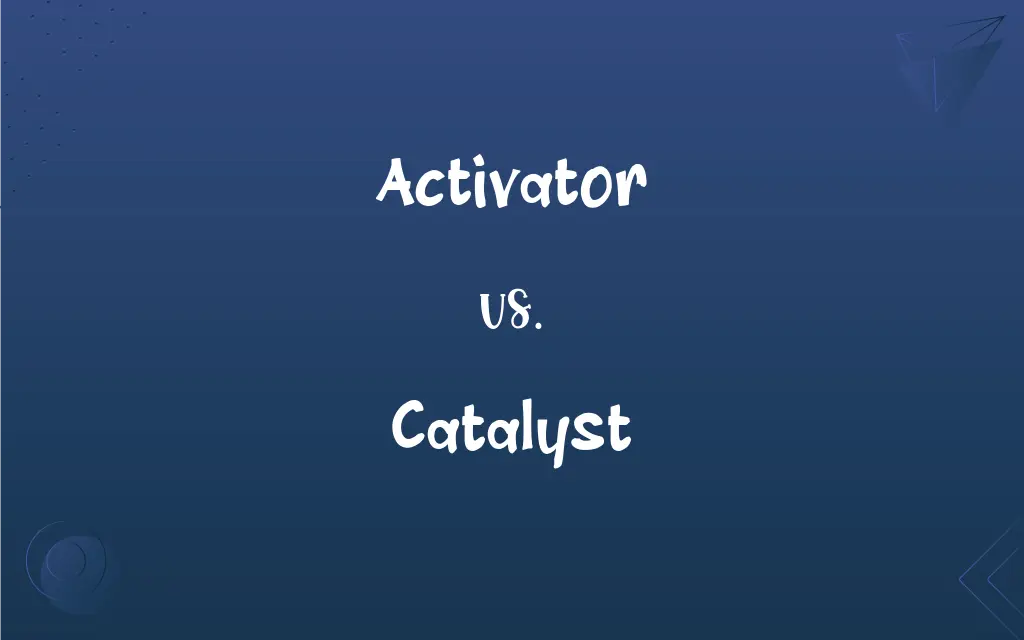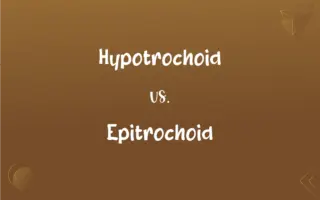Activator vs. Catalyst: What's the Difference?
Edited by Aimie Carlson || By Janet White || Updated on November 21, 2023
An activator increases the activity of a specific enzyme or process, while a catalyst speeds up a chemical reaction without being consumed in the process.

Key Differences
Activators are substances that increase the activity of enzymes, often by changing the enzyme's shape or structure to enhance its interaction with substrates. Catalysts, in contrast, are substances that speed up chemical reactions without undergoing any permanent chemical change themselves.
In biochemical processes, activators play a key role in regulating metabolic pathways by activating specific enzymes. Catalysts, often used in various chemical industries, accelerate a wide range of reactions but remain unchanged at the end of the reaction.
The mechanism of action of an activator is specific to the enzyme or process it influences, often requiring a precise fit or interaction. Catalysts work by lowering the activation energy of a reaction, making it easier for the reactants to undergo the reaction.
While activators are often involved in biological processes and are usually specific to certain enzymes or molecular pathways, catalysts are used in both biological and industrial chemical reactions, with a broader range of applications.
Activators are essential in controlling the rate of biological reactions and can be influenced by various factors like pH and temperature. Catalysts, while not typically involved in the regulation of biological pathways, play a crucial role in increasing the efficiency of chemical processes.
ADVERTISEMENT
Comparison Chart
Definition
Increases enzyme activity
Speeds up chemical reactions
Usage
Primarily in biological processes
In biological and industrial chemical reactions
Mechanism
Often changes enzyme structure or shape
Lowers activation energy of reactions
Specificity
Specific to certain enzymes or pathways
Broad range of applications
Change in Reaction
Does not undergo permanent change
Remains unchanged after reaction
ADVERTISEMENT
Activator and Catalyst Definitions
Activator
An activator can initiate or increase the rate of a biochemical process.
A hormonal activator triggered the metabolic response.
Catalyst
Catalysts lower the activation energy needed for a reaction.
The catalyst made the chemical synthesis more efficient.
Activator
In genetics, an activator can enhance gene expression.
The activator in the DNA facilitated increased protein production.
Catalyst
A catalyst is a substance that speeds up a chemical reaction without being consumed.
Enzymes are biological catalysts in the human body.
Activator
An activator is a substance that increases the activity of an enzyme.
Calcium ions act as an activator for many enzymes.
Catalyst
In environmental technology, catalysts are used for pollution control.
Catalytic converters in cars reduce harmful emissions.
Activator
In chemistry, an activator can modify a surface to increase its reactivity.
The surface was treated with an activator to improve the bonding.
Catalyst
Catalysts can be used repeatedly in multiple reaction cycles.
The catalyst was recycled in several rounds of the reaction.
Activator
Activators are often used to regulate metabolic pathways in organisms.
The activator was crucial in regulating the cell's energy production.
Catalyst
In industrial processes, catalysts are used to enhance reaction rates.
The industrial reactor used a platinum catalyst.
Activator
To set in motion; make active or more active.
Catalyst
(Chemistry) A substance, usually used in small amounts relative to the reactants, that modifies and increases the rate of a reaction without being consumed in the process.
Activator
To organize or create (a military unit, for example)
Activate the National Guard.
Catalyst
One that precipitates a process or event, especially without being involved in or changed by the consequences
"A free press ... has remained ... a vital catalyst to an informed and responsible electorate" (Robert O'Neal).
FAQs
Can catalysts be used multiple times?
Yes, catalysts can be used repeatedly in multiple reactions.
What is a catalyst?
A catalyst is a substance that speeds up a chemical reaction without being consumed.
Is an activator always a chemical?
Activators can be chemicals, ions, or even molecules like DNA segments.
How do catalysts affect environmental technology?
Catalysts are used in environmental tech to reduce pollution.
What are common catalysts in industry?
Metals like platinum and enzymes are common industrial catalysts.
How do catalysts work in chemical reactions?
Catalysts lower the activation energy, making reactions easier to occur.
Do activators work on all enzymes?
Activators are usually specific to certain enzymes or pathways.
What is an activator?
An activator is a substance that increases the activity of an enzyme or process.
Are activators consumed in reactions?
Activators are not consumed but can be altered or regulated.
What is a biological catalyst?
Enzymes are examples of biological catalysts.
Do activators have industrial applications?
Activators are primarily used in biological or chemical processes.
Can catalysts be artificially synthesized?
Yes, many catalysts are synthetically produced for specific reactions.
Can catalysts be enzymes?
Yes, enzymes are a common type of biological catalyst.
Are activators used in genetics?
Yes, activators are used to regulate gene expression in genetics.
What role do activators play in metabolism?
Activators regulate the rate and pathway of metabolic reactions.
Can an activator be a hormone?
Yes, hormones can act as activators in biological systems.
How does pH affect activators?
The effectiveness of activators can be influenced by pH levels.
Is an activator a type of catalyst?
While similar in function, activators and catalysts have distinct roles.
Are all catalysts inorganic substances?
No, catalysts can be both organic (like enzymes) and inorganic.
Do catalysts alter the equilibrium of a reaction?
Catalysts do not alter the equilibrium; they only speed up the reaction rate.
About Author
Written by
Janet WhiteJanet White has been an esteemed writer and blogger for Difference Wiki. Holding a Master's degree in Science and Medical Journalism from the prestigious Boston University, she has consistently demonstrated her expertise and passion for her field. When she's not immersed in her work, Janet relishes her time exercising, delving into a good book, and cherishing moments with friends and family.
Edited by
Aimie CarlsonAimie Carlson, holding a master's degree in English literature, is a fervent English language enthusiast. She lends her writing talents to Difference Wiki, a prominent website that specializes in comparisons, offering readers insightful analyses that both captivate and inform.































































